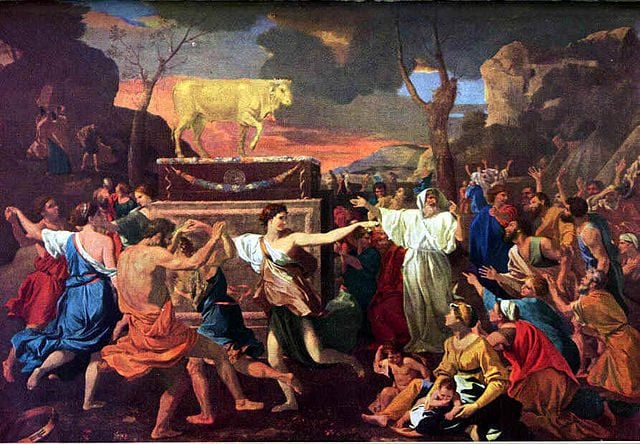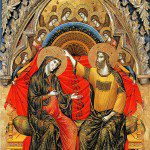
Real idolatry: The Adoration of the Golden Calf (1633), by Nicolas Poussin (1594-1665) [public domain / Wikimedia Commons]
*****
(11-22-96)
***
An anti-Catholic Protestant evangelical stated in a list I was on:
Transubstantiation is a form of idolatry. The Catholic belief in transubstantiation is why when the host is elevated, Catholics bow and pay homage.
The charge of idolatry is absolutely wrongheaded. To be an idolater is fundamentally to put something in place of God. An animist who is truly worshiping a statue of wood or stone or amulet as God in and of itself (i.e., over against the true, one Creator God) is a true idolater. The Catholic (or Lutheran, or Anglican, or Orthodox, broadly speaking) is doing no such thing, for they believe that the one true Creator God is really, truly, substantially present under the appearances of bread and wine.
Thus, they are consciously worshiping the eternal God, as far as they are concerned, not a piece of bread (this is especially true for Catholics, who maintain that the bread and wine are no longer even there, but only the appearance or “accidents”). Nor is the Lutheran worshiping the bread and wine which he still believes is present after consecration, but God, who is now present “in, with, and under” the elements of bread and wine (consubstantiation). Now, one may wish to quibble with the belief in the Real Presence and/or transubstantiation (a development of same), but it is a very incoherent argument to claim that one is committing idolatry when in fact they are consciously worshiping God Himself in the consecrated Host (as we believe). That is the very opposite of idolatry.
I maintain that one of the impulses against the Real Presence in Protestant theology and presuppositions, is a Docetic and/or Nestorian (even sometimes quasi-Gnostic) tendency, which frowns upon matter as a conveyor of grace, and denigrates the consequent sacramentalism, which flows from that notion. Trouble is, this (logically speaking) affects one’s views of the incarnation (and by extension, Christ’s atonement) as well. How is it that God could take on flesh and become a Man, but couldn’t possibly become truly present in a miracle which transforms the essence of bread and wine? The Jews and Unitarians regard the incarnation as every bit as unthinkable as many evangelicals regard the Real Presence. But neither scenario is any more philosophically implausible or impossible than the other.
So — in my opinion — there is no a priori objection to such a possibility that holds any water, nor is it idolatry, as so many Protestants cavalierly assume, and once all the relevant scriptural data and extremely strong patristic evidence is also brought into consideration, it is not only not impossible, but prima facie plausible and likely. But belief in the Real Presence will still assuredly require much faith, as it did for the hearers of our Lord’s discourse in John 6, the only instance we have in the Bible (I’m pretty sure) of believers forsaking Jesus for doctrinal reasons.
Related Papers:
*****













